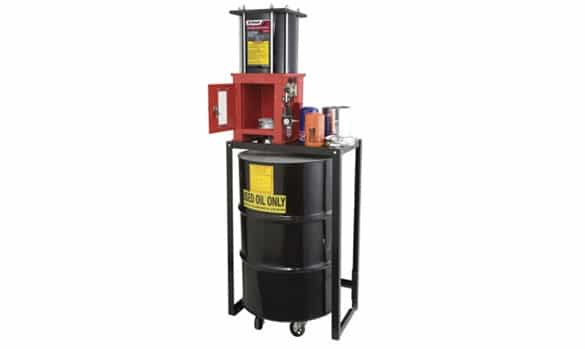CALL US TOLL FREE | 9am-6pm EST | M-F
LOCATIONS ACROSS THE NATION | TO SERVE THE ENTIRE COUNTRY
Leading Automotive Equipment Dealer Since 1987
CALL US TOLL FREE | 9am-6pm EST | M-F
LOCATIONS ACROSS THE NATION | TO SERVE THE ENTIRE COUNTRY
Leading Automotive Equipment Dealer Since 1987
Cardealerships, vehicle repair centers, and independent shops all have an environmental responsibility to properly dispose of automotive fluids. Some of the most harmful automotive products include antifreeze, oil, and transmission fluid. Knowing how to properly dispose of these fluids is critical to maintaining your reputation as a responsible business. In this guide, we discuss used oil filter disposal and explain how to recycle transmission fluid. We also provide information about used oil filter disposal regulations, so you can remain compliant and make safety a top priority.
 Used motor oil is indissoluble and can contain toxic chemicals or heavy metals that are harmful to humans, animals, and the earth. A typical vehicle maintenance facility performs oil changes on a regular basis, so it is important to learn about the regulations. Identify whether you generate hazardous waste to determine if you are subject to the Resource Conservation and Recovery Act (RCRA) hazardous waste regulations. Characteristics of hazardous waste include ignitability, corrosivity, reactivity, and toxicity.
Used motor oil is indissoluble and can contain toxic chemicals or heavy metals that are harmful to humans, animals, and the earth. A typical vehicle maintenance facility performs oil changes on a regular basis, so it is important to learn about the regulations. Identify whether you generate hazardous waste to determine if you are subject to the Resource Conservation and Recovery Act (RCRA) hazardous waste regulations. Characteristics of hazardous waste include ignitability, corrosivity, reactivity, and toxicity.
According to the Environmental Protection Agency (EPA), an estimated 380 million gallons of used oil are recycled every year. Used motor oil can be refined and sold as motor oil or processed to be used as furnace fuel oil. Used oil filter disposal is also an important part of responsible recycling. There are many used oil filter disposal regulations to follow accordingly so you can protect the planet. The Filter Manufacturers' Council maintains a regulatory hotline and database to encourage the proper management of used oil filters. By calling the hotline at 800-99-FILTER, you can access the proper management requirements for your particular state.
Most types of transmission fluid are made from petroleum-based products or synthetic materials. No matter what kind of fluid your vehicle relies on, it likely contains chemicals that can severely impact the environment, such as anti-rust agents, anti-foaming agents, and more. You should assemble several supplies before you attempt to change the fluid: a catch pan that's large enough to hold three gallons or more, a transmission filter, and a pan gasket. Collect any used transmission fluid in the change pan or container. You should never mix transmission fluids with any other kind of fluids. Transmission fluid can be processed and recycled into new fluids, but most facilities will toss out mixtures rather than recycle them.
Contact your city or town administrative offices to find out where there are approved collection sites in your area. You should also contact the collection site of your choice to ensure that they can safely accept transmission fluids. Some auto supply stores will also dispose of fluids and oils for you, but participation in fluid recycling programs is voluntary. Locations that accept used motor oils will usually accept transmission fluids as well. When you visit your local household hazardous waste facility, you should handle your transmission fluids with great care. Place them in a leak-proof container and seal the lid tightly to prevent them from spilling or contaminating nearby areas.